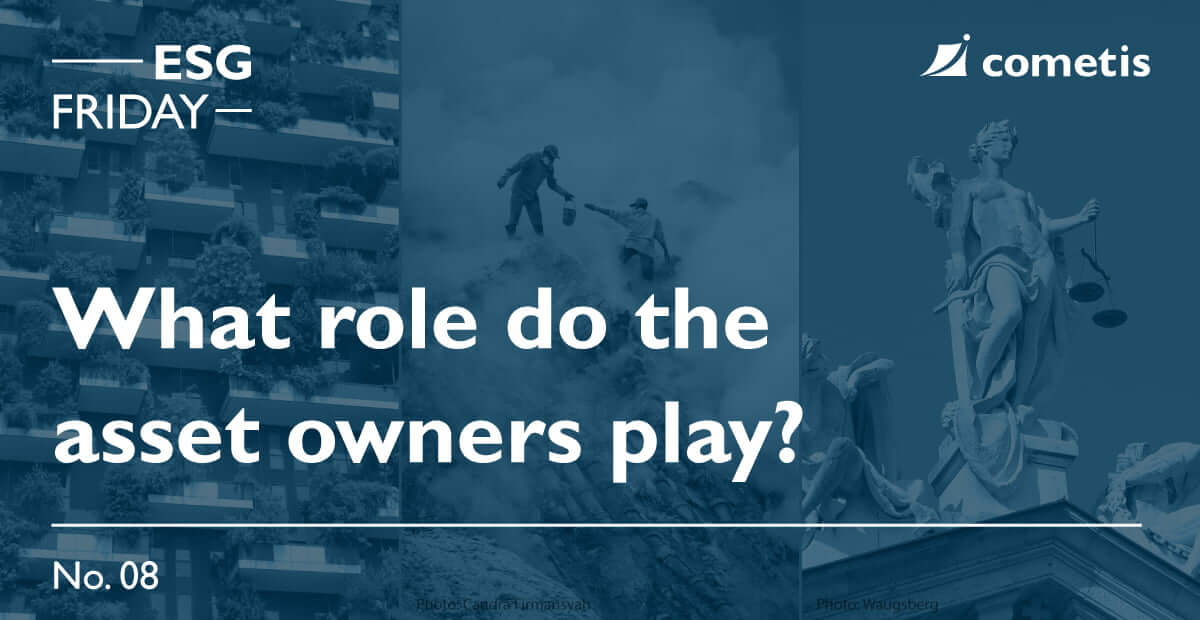ESG: The role of asset owners
The growing popularity of sustainable investments reflects the increasing awareness of ESG issues worldwide. Asset owners no longer have the sole intention to make pure returns with their money, but also want to ensure ecological and social improvements.
Why are investors increasingly turning to ESG products?
Climate change and growing social inequality are causing more and more people to worry about the future. In the financial world, these concerns are expressed in an expansion of the risk criteria of investments: Investors are increasingly realizing that companies can no longer operate in a vacuum in our rapidly changing world. They are caught up in social and ecological megatrends – with potentially significant consequences for corporate values. Asset owners are therefore progressively investing their money in companies that are less likely to be affected by the negative consequences – because this will ensure that their investments remain comparatively secure in the future. On the other hand, ESG investors want to support companies that fight climate change and social inequality, in order to make a small contribution with their money to get a grip on these human problems. As a result, a massive change can be observed in the markets: In 2019 alone, assets managed according to ESG criteria increased by 26% in comparison to 2018.
What ESG requirements do asset owners impose on their investments?
In the meantime, four different investment concepts have established themselves in the ESG investment specifications of asset owners:
1. ESG-Screened
This selection category excludes companies from certain industries that are considered socially or environmentally problematic (e.g. petroleum, defense or gambling companies). Sometimes companies are also excluded across the board if they do not comply with recognized international standards (e.g. do not take sufficient action against child labor).
2. ESG-Integration
When ESG integration is discussed in an investment decision, specific ESG factors are incorporated into all investment decisions and across all asset classes. This means that companies that fail to demonstrate a minimum level of ESG commitment in a peer group comparison of their industry (e.g. are lower than a certain ESG rating) are automatically excluded.
3. Sustainable and Responsible Investments (SRI)
SRIs select those companies that set particularly high standards in terms of ESG. Non-financial information is given the same importance as financial information. There are various approaches to SRI investments. For example, funds are set up that include companies that demonstrate a particularly high level of SDG commitment or are particularly committed to social projects.
4. Impact Investing
Companies whose business model is primarily geared towards making a positive social or ecological contribution are the target of so-called impact investing. Support is given to companies in the field of sustainable agriculture or the production of renewable energies, among others.
How do asset managers react to the trend?
Asset managers manage the money of the asset owners. To meet the ESG requirements of these asset owners, asset managers must rethink and adapt their traditional practices. To decide whether an investment is ESG-compliant, they need to establish their own research departments and processes or call in appropriate external specialists to support them in the evaluation process. At the same time, many asset managers are also taking a proactive approach to marketing financial products with terms such as “ESG”, “green” or “sustainable” in their names. The problem is that the use of these terms has not yet been made sufficiently transparent to investors.
Nevertheless, the trend towards sustainable investments is already helping companies to reflect more strongly on ESG issues in their business activities. The more money the asset owner continues to invest in sustainable investments, the more this trend will continue – and perhaps actually make a small but important contribution to making the world a little better.
Do you want to convince investors of your sustainability strategy? We can offer professional support.
Click [HERE] to learn more about the ESG competencies of cometis.

